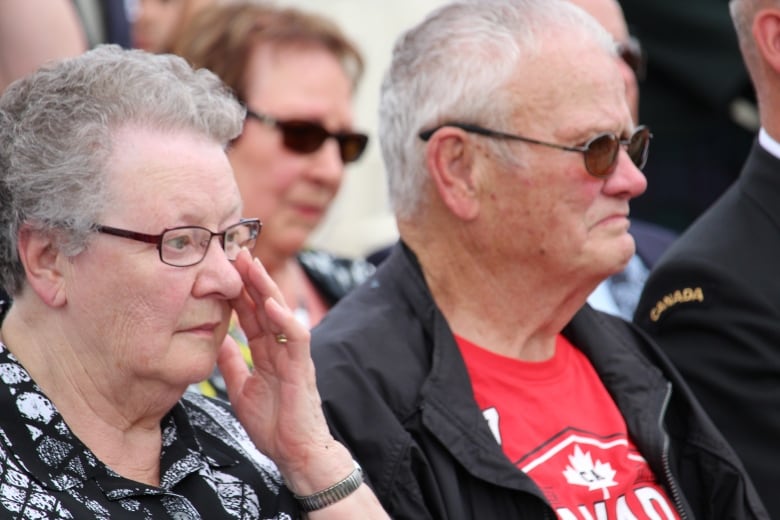100-year-old mystery comes to end as Manitoba WW I soldier laid to rest in France
Pte. Reginald Johnston's remains, discovered in 2011, buried during ceremony at Loos-en-Gohelle

The bones of a Manitoba soldier have finally been laid to rest next to his brothers-in-arms, bringing a 100-year-old mystery to an end.
Pte. Reginald Joseph Winfield Johnston was buried Thursday at Loos British Cemetery in Loos-en-Gohelle, France. Another fallen Canadian soldier, Sgt. Harold Wilfred Shaughnessy of New Brunswick, was also interred at the same ceremony.
"'Missing in action' was a term I heard early in my life," said Johnston's niece Ethel Cottrell, who was born 20 years after her uncle was listed as MIA.
"The grieving was over but Uncle Reginald was always mentioned. In my mind he was a picture of a five-year-old, a picture I still have.
"The ceremony today makes Uncle Reginald real to me."

Johnston, originally from Fairfield, Man., enlisted in 1916 at the age of 20. The member of the 16th Battalion, Canadian Expeditionary Force died on Aug. 15 or 16, 1917 in the Battle of Hill 70.

A forensic anthropologist narrowed down the possibilities of who the bones could belong to and tracked down Johnston's great-niece, Lorraine Leniuk, who provided her DNA to see whether there was a match.
There was.
Leniuk, who is from Petersfield, Man., went to the ceremony in France along with numerous other family members, including Cottrell, Cottrell's daughter and Cottrell's brother.
"I am sure my dad, his parents and siblings would be happy with the outcome and comforted to know the family was represented at this memorial to their lost son and brother," said Cottrell.
"I hope other Canadian families find the same closure to their family stories."

The Battle of Hill 70 took place four months after Vimy Ridge. About 100,000 Canadian soldiers fought there, and 1,877 died. It was the first time Canadian forces were led in the First World War by a Canadian commander.
The final resting place of more than 11,000 Canadians killed in action in France is unknown.
The family participated not only in Thursday's ceremony, but also in the Hill 70 Memorial Park opening on Tuesday.
"We're all put here for a purpose," Leniuk told CBC before she left, "and my purpose is to journey to France and to see him laid to rest, and to thank him for his service and my freedom, living in the beautiful country of Canada."
